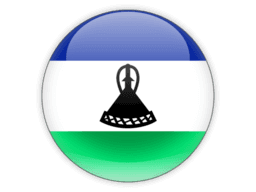
Cities of Lesotho
Discover 27 cities across 10 regions
Butha-Buthe(1)
Mafeteng District(1)
Maseru District(7)
Mohale's Hoek District(2)
Mokhotlong District(1)
Qacha's Nek District(1)
Thaba-Tseka(2)
Other Cities (3)
Lesotho is a landlocked country located in Southern Africa, surrounded by South Africa. Its capital and largest city is Maseru. The official languages of Lesotho are Sesotho and English, and the currency is the Lesotho loti.
Lesotho has a population of around 2.3 million people, and the country is known for its mountainous landscapes, which have earned it the nickname "The Kingdom in the Sky". Lesotho is home to the highest peak in Southern Africa, Thabana Ntlenyana, which stands at 3,482 meters (11,423 feet) tall.
The economy of Lesotho is largely based on agriculture, particularly the growing of maize, wheat, beans, and peas. The country also has significant diamond reserves, and mining is a major industry. Lesotho is a member of the Southern African Development Community (SADC) and the African Union (AU).
Tourism is a growing industry in Lesotho, with visitors drawn to its natural beauty and cultural heritage. Popular attractions include the Sehlabathebe National Park, which features a variety of landscapes, including mountains, valleys, and rivers, as well as cultural sites like the Thaba-Bosiu Cultural Village, which offers a glimpse into the traditional way of life of the Basotho people.
Other activities that attract visitors to Lesotho include hiking, skiing, and rock climbing in the mountains, as well as bird-watching and game-viewing in the national parks. The country is also known for its textiles, with many visitors purchasing locally-made woolen products as souvenirs.
Telephone Code
266
Local Emergency Phone
Ambulance: 121; Fire: 122; Police: 123, 124
Vaccinations
An International Certificate of Vaccination for yellow fever is required for travelers arriving from countries with a risk of yellow fever transmission and for travelers having transited through the airport of a country with risk of yellow fever transmission. See WHO recommendations.
Climate
Temperate; cool to cold, dry winters; hot, wet summers
Currency (Code)
Maloti (LSL)
Electricity/Voltage/Plug Type(s)
220 V / 50 Hz / plug types(s): M
Major Languages
Sesotho (southern Sotho), English, Zulu, Xhosa
Major Religions
Protestant 47.8% (Pentecostal 23.1%, Lesotho Evangelical 17.3%, Anglican 7.4%), Roman Catholic 39.3%, other Christian 9.1%, non-Christian 1.4%
Potable Water
Opt for bottled water
International Driving Permit
Suggested
Road Driving Side
Left
Tourist Destinations
Sehlabathebe National Park; Thaba Bosiu Mountain; Ts’ehlanyane National Park; Liphofung Nature Reserve
Major Sports
Soccer, boxing, judo, cricket
Cultural Practices
Generally, counting on one's hands is done in the opposite order as is common in many Western countries, beginning at the pinky and progressing towards the thumb.
Tipping Guidelines
At most restaurants tipping is expected and 10-15% is appropriate. The exceptions are in rural parts of Lesotho where it is generally the custom to simply round up the bill. Tipping taxi drivers 10% is expected.
Souvenirs
Hand-woven wool/mohair clothing, tapestries, and accessories; traditional woven grass hats; leather goods; silver, gold, and diamond jewelry
Traditional Cuisine
Papa — boiled cornmeal porridge
Geography
Area
total: 30,355 sq km
land: 30,355 sq km
water: 0 sq km
Climate
temperate; cool to cold, dry winters; hot, wet summers
Natural resources
water, agricultural and grazing land, diamonds, sand, clay, building stone
People and Society
Population
2,210,646 (2023 est.)
Ethnic groups
Sotho 99.7%, Europeans, Asians, and other 0.3%
Languages
Sesotho (official) (southern Sotho), English (official), Zulu, Xhosa
Religions
Protestant 47.8% (Pentecostal 23.1%, Lesotho Evangelical 17.3%, Anglican 7.4%), Roman Catholic 39.3%, other Christian 9.1%, non-Christian 1.4%, none 2.3% (2014 est.)
Population growth rate
0.76% (2023 est.)
Government
Government type
parliamentary constitutional monarchy
Capital
name: Maseru
Economy
Economic overview
lower middle-income economy surrounded by South Africa; environmentally fragile and politically unstable; key infrastructure and renewable energy investments; dire poverty; urban job and income losses due to COVID-19; systemic corruption
Real GDP (purchasing power parity)
$5.236 billion (2021 est.)
Real GDP per capita
$2,300 (2021 est.)
Agricultural products
milk, potatoes, maize, vegetables, fruit, beef, game meat, mutton, beans, wool
Industries
food, beverages, textiles, apparel assembly, handicrafts, construction, tourism
Exports
$1.08 billion (2021 est.)
Exports - partners
United States 29%, Belgium 26%, South Africa 25%, Switzerland 6% (2019)
Exports - commodities
diamonds, clothing and apparel, low-voltage protection equipment, wheat products, footwear (2019)
Imports
$2.221 billion (2021 est.)
Imports - partners
South Africa 85%, China 5% (2019)
Imports - commodities
refined petroleum, clothing and apparel, packaged medicines, delivery trucks, poultry meats (2019)
International Airports in Lesotho
Discover 1 major airports serving Lesotho
Mark Lesotho as Visited
Add Lesotho to your personal travel map and track your journey around the world. Share your adventures and see your progress grow!